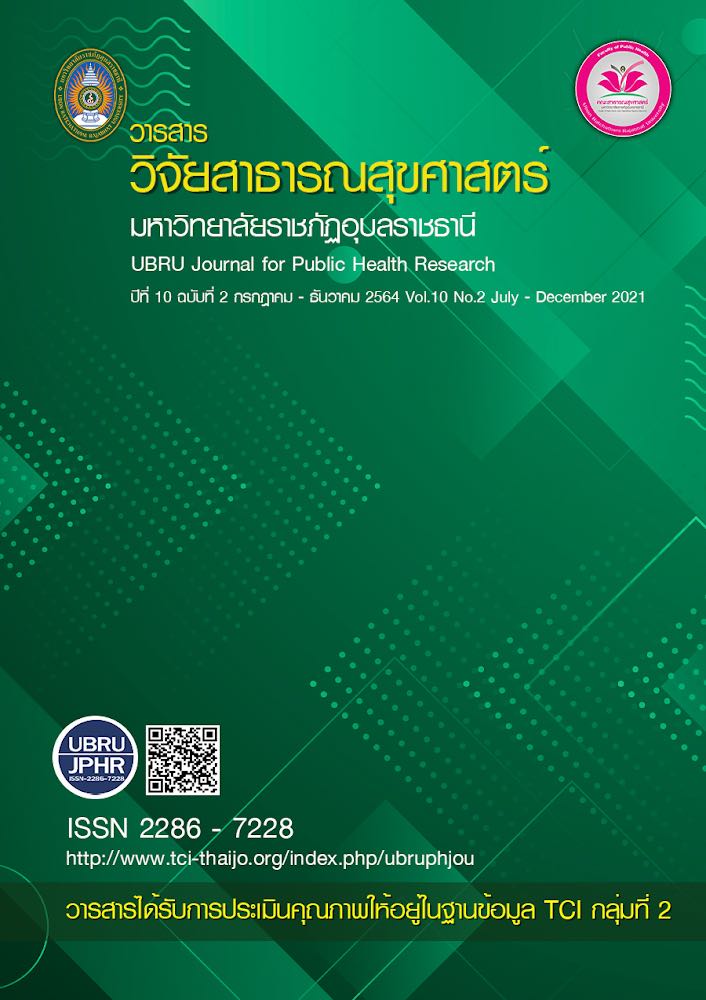Factors related to consumption behavior of weight loss diet products of third year students community health a university in the north
Keywords:
Weight loss diet products, students, consumption behaviorAbstract
The Cross-sectional research aimed to study factors related to consumption behavior of Weight Loss Diet Products of third year students community health a university in the north of third year students community health branch A university in the north. The sample consisted of 140 cases. were selected by accidental or convenience sampling. Data were collected by using questionnaires. Data were analyzed using, percentage, mean, standard deviation and chi-square test.
The results of the showed that of the women was (85.70%), age 21 year old (74.30%), body mass index (BMI) normal (69.20%), normal circumference (88.60%), Student in Community Health (93.60%), Buddism (93.60%),Live in a dormitory outside university (75.00%), not underlying disease (94.30%), A sample had knowledge about the use of weight loss supplements low level (58.60%), attitude about the use of weight loss supplements moderate level (53.60%) and behaviors about the use of weight loss supplements low level (46.43%). The analysis of the relationships found that age, income, education plan and knowledge were significantly related to behaviors at p-value ≤ 0.05. however, gender, body mass index (BMI), waist circumference, religion, place of residence, congenital disease and attitudes were not related to behavior of Weight Loss Diet Products.
In conclusion, most consumers have low levels of consumption behavior of dietary supplements, with age, income, study plan and knowledge as factors related to consumption behavior of dietary supplements. Therefore, students should eat properly. Principles of nutrition Exercise regularly to promote health and reduce the consumption of weight loss supplements.
References
มัณทนาวดี เมธาพัฒนะ. (2560). ปัจจัยที่มีความสัมพันธ์กับพฤติกรรมการบริโภคอาหารของนักศึกษาพยาบาล. วารสารคณะพยาบาลศาสตร์ มหาวิทยาลัยบูรพา. 25(3).20-29.
ละอองดาว คำชาตา ชดช้อย วัฒนะ และธีรนุช ห้านิรัติศัย. (2560). ผลของโปรแกรมการจัดการตนเองต่อพฤติกรรมการจัดการตนเองเส้นรอบวงเอว ระดับน้ำตาลในเลือดและความเสี่ยงต่อการเกิดโรคหัวใจและหลอดเลือด ในผู้ที่มีกลุ่มอาการเมตาโบลิก. พยาบาลสาร. 44(3).45-76.
ลักษณาวลัย มหาโชติ. (2558). การศึกษาปัจจัยที่ส่งผลต่อพฤติกรรมการควบคุมน้ำหนักของสมาชิกชมรมแอโรบิค อำเภอเมือง จังหวัดนครปฐม. ฉบับภาษาไทย สาขามนุษยศาสตร์ สังคมศาสตร์ และศิลปะ. 8(2).2833-2843.
วารุณี ชลวิหารพันธ์. (2559). ความชุกของการใช้ผลิตภัณฑ์สุขภาพเพื่อควบคุมน้ำหนักอย่างไม่เหมาะสมของวัยรุ่นหญิง ในจังหวัดสระบุรีและปัจจัยที่มีผล. วารสารเภสัชกรรมไทย. 8(2).442-455.
ศิวรักษ์ กิจชนะไพบูลย์. (2555). พฤติกรรมการลดนํ้าหนักที่ไม่ถูกต้องของวัยรุ่นและเยาวชนไทย. พยาบาลสาร. 39(4).179-190.
สามารถ ใจเตี้ย ส.ด. (2558). ปัจจัยที่มีความสัมพันธ์กับการบริโภคอาหารพื้นบ้านของผู้สูงอายุในเขตเมือง. วารสารวิทยาลัยพยาบาลบรมราชชนนี. 31(2).1-8.
Best, John W. (1977). Research in Education. 3rd ed. Englewood Cliffs, New Jersey: Prentice Hall, Inc.
Brandsolutions. (2562). อนาคตของตลาดอาหารเสริมไทยปี 2018-2019. แหล่งที่มา https://www.brandsolutionsthailand.com
Krejcie, R. V., & Morgan, D. W. (1970). Determining sample size for research activities. Educational and Psychological Measurement, 30(3), 607–610.
Downloads
Published
How to Cite
Issue
Section
License
เนื้อหาและข้อมูลในบทความที่ลงตีพิมพ์ในวารสารวารสารวิจัยสาธารณสุขศาสตร์ มหาวิทยาลัยราชภัฏอุบลราชธานี ถือเป็นข้อคิดเห็นและความรับผิดชอบของผู้เขียนบทความโดยตรงซึ่งกองบรรณาธิการวารสาร ไม่จำเป็นต้องเห็นด้วย หรือร่วมรับผิดชอบใดๆ
บทความ ข้อมูล เนื้อหา รูปภาพ ฯลฯ ที่ได้รับการตีพิมพ์ในวารสารนี้ ถือเป็นลิขสิทธิ์ของวารสารฯ หากบุคคลหรือหน่วยงานใดต้องการนำทั้งหมดหรือส่วนหนึ่งส่วนใดไปเผยแพร่ต่อหรือเพื่อกระทำการใดๆ จะต้องได้รับอนุญาตเป็นลายลักอักษรณ์จากบรรณาธิการวารสารนี้ก่อนเท่านั้น


